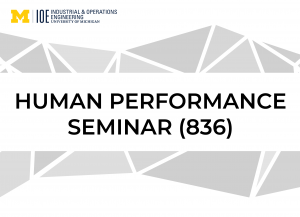Presented By: Industrial & Operations Engineering
Human Performance Seminar (836): Chris Wickens, PhD, Colorado State University

The Human Performance Seminar Series (836) from the Center for Ergonomics is open to all. U-M Industrial and Operations Engineering graduate students and faculty are especially encouraged to attend.
Title:
“The Lumberjack Model of Human-Automation Interaction: The Higher the Tree, the Harder It Falls”
Abstract:
The lumberjack model proposes a relation between the degree of automation and 4 human performance measures: Performance when automation works as intended, performance when automation fails, workload, and situation awareness. The degree of automation refers jointly to what stage of human information processing automation supports: selective attention, diagnosis, decision making and action execution, and to the level of automation within a stage. Accordingly, with a higher degree of automation, routine performance is improved and workload reduced, but performance when automation fails is degraded, a degradation that is caused by a progressively greater loss of situation awareness with a higher degree of automation.
Professor Wickens will describe the results of a meta-analysis and two experiments that support, to varying degrees, the 4 trends underlying the lumberjack model. In the first experiment, participants (Wolverines!!) perform a robotics task, that is assisted by either a low or high degree of imperfect automation. In the second experiment, air traffic controllers employ an imperfect automated decision aid. The second experiment also shows how the costs of automation failure can be cushioned by building transparency into automation operations.
Bio:
Chris Wickens received his PhD in psychology from the University of Michigan in 1974, after serving 3 years in the US Navy. He was a Professor in Psychology at University of Illinois from 1974-2005. From 1984-2005 he was also jointly appointed with the Department of Industrial Engineering, and the Institute of Aviation, where he was Associate Director and Head of the Aviation Human Factors Division.
He has published two textbooks in human factors and engineering psychology, and 6 other professional books, and has co-authored over 250 articles in refereed publications or book chapters. His research interests are in the human factors of transportation systems, the study of human attention and its relevance to display design, and human-automation interaction. He is an avid mountain climber.
Title:
“The Lumberjack Model of Human-Automation Interaction: The Higher the Tree, the Harder It Falls”
Abstract:
The lumberjack model proposes a relation between the degree of automation and 4 human performance measures: Performance when automation works as intended, performance when automation fails, workload, and situation awareness. The degree of automation refers jointly to what stage of human information processing automation supports: selective attention, diagnosis, decision making and action execution, and to the level of automation within a stage. Accordingly, with a higher degree of automation, routine performance is improved and workload reduced, but performance when automation fails is degraded, a degradation that is caused by a progressively greater loss of situation awareness with a higher degree of automation.
Professor Wickens will describe the results of a meta-analysis and two experiments that support, to varying degrees, the 4 trends underlying the lumberjack model. In the first experiment, participants (Wolverines!!) perform a robotics task, that is assisted by either a low or high degree of imperfect automation. In the second experiment, air traffic controllers employ an imperfect automated decision aid. The second experiment also shows how the costs of automation failure can be cushioned by building transparency into automation operations.
Bio:
Chris Wickens received his PhD in psychology from the University of Michigan in 1974, after serving 3 years in the US Navy. He was a Professor in Psychology at University of Illinois from 1974-2005. From 1984-2005 he was also jointly appointed with the Department of Industrial Engineering, and the Institute of Aviation, where he was Associate Director and Head of the Aviation Human Factors Division.
He has published two textbooks in human factors and engineering psychology, and 6 other professional books, and has co-authored over 250 articles in refereed publications or book chapters. His research interests are in the human factors of transportation systems, the study of human attention and its relevance to display design, and human-automation interaction. He is an avid mountain climber.